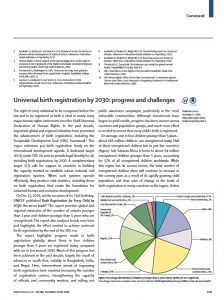
The right of every individual to be recognized before the law and to be registered at birth is cited in nearly every major human rights instrument since the 1948 Universal Declaration of Human Rights. In the past decade, important global and regional initiatives have promoted the advancement of birth registration, including the Sustainable Development Goal (SDG) framework.
This major milestone put birth registration firmly on the international development agenda. A dedicated target (16.9) under SDG 16 aims to provide legal identity for all, including birth registration, by 2030. A complementary target 17.9 calls for support to countries in building the capacity needed to establish robust national civil registration systems. When such systems operate effectively, they produce vital statistics, including those on birth registration, that create the foundation for sustained human and economic development.
On Dec 11, 2019, on the occasion of its 73rd birthday, UNICEF published Birth Registration for Every Child by 2030: Are we on track?
The report provides global and regional estimates of the number of infants younger than 1 year and children younger than 5 years who are unregistered. The report also analyses trends over time and highlights the effort needed to achieve universal birth registration by the end of the SDG era.
The report highlights progress made in birth registration globally: about three in four children younger than 5 years are registered today compared with six in ten around 2000. Much of this progress has been achieved in the past decade, largely the result of advances in south Asia, notably in Bangladesh, India, and Nepal. Here, interventions aimed at improving birth registration have involved increasing the number of registration centres, strengthening the capacity of officials and community workers, and rolling out public awareness campaigns, particularly in the most vulnerable communities. Although investments have begun to yield results, progress has been uneven across countries and population groups, and much more effort is needed to ensure that every child’s birth is registered.
On average, one in four children younger than 5 years—about 166 million children—are unregistered today. Half of these unregistered children live in just five countries (figure). Sub-Saharan Africa is home to about 94 million unregistered children younger than 5 years, accounting for 57% of all unregistered children worldwide. While this region has its success stories, the total number of unregistered children there will continue to increase in the coming years as a result of its rapidly growing child population and slow rates of change in the levels of birth registration in many countries in the region. Unless progress is accelerated, the number of unregistered children in sub-Saharan Africa is expected to exceed 100 million by 2030.
Insufficient progress or even stagnation can also be seen in regions where birth registration has traditionally been high, including in the Middle East and North Africa and Latin America and the Caribbean. Targeted action must be taken to accelerate progress in birth registration among socially disadvantaged groups and to ensure that all children are reached.
Investing in reliable, confidential, and innovative technologies is one strategy that can advance birth registration and certification and expand coverage by bringing services closer to families. Linking civil registration to other social services such as education, health, and social protection benefits increases the chances that unregistered children will be identified. Eliminating discrimination that may exist in nationality laws and policies can serve to empower all parents, irrespective of gender, marital status, or nationality, to register their children at birth.
Yet raising levels of birth registration alone is not enough. Improvements are needed to the quality of civil registration systems to ensure the continuity and sustainability of services as well as the accessibility of records. Moreover, it is imperative that data collection is safe and secure. Birth registration systems, including those that are incorporating new technologies, should be regularly monitored to safeguard the confidentiality of data and information collected about children and their caregivers.
A UNICEF review of 14 countries found evidence of progress, as well as remaining gaps, in the functioning of civil registration systems.
Most of these countries had plans in place to improve those systems, but a host of challenges remain such as insufficient legal frameworks, complex and cumbersome processes for registration, underdeveloped coordination and quality assurance mechanisms, and insufficient financial and human resources. Other more basic problems persist. For example, in half of 45 countries with available data, most mothers or caregivers of unregistered children do not have the knowledge of how to register a child’s birth. And in many countries, there are prohibitive fees associated with birth registration—a stubborn obstacle to further progress. So, although technology can help systems become more effective and sustainable, the basic groundwork needs to be laid in terms of raising demand and improving accessibility to families.
If societies are to become truly inclusive and equitable, every child must be registered at birth. By providing all children with proof of legal identity from day 1, their rights can be protected and universal access to social services becomes one step closer.